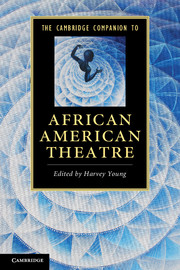Book contents
- Frontmatter
- Contents
- Illustrations
- Contributors
- Acknowledgements
- Chronology
- Introduction
- 1 Slavery, performance, and the design of African American theatre
- 2 Slave rebellions on the national stage
- 3 Early black Americans on Broadway
- 4 Drama in the Harlem Renaissance
- 5 The Negro Little Theatre Movement
- 6 African American women dramatists, 1930–1960
- 7 Amiri Baraka and the Black Arts Movement
- 8 Fragmented musicals and 1970s soul aesthetic
- 9 Spectacles of whiteness from Adrienne Kennedy to Suzan-Lori Parks
- 10 African American performance and community engagement
- 11 Women playwrights who cross cultural borders
- 12 African Diaspora drama
- 13 Black theatre in the age of Obama
- Further reading
- Index
- References
8 - Fragmented musicals and 1970s soul aesthetic
Published online by Cambridge University Press: 05 December 2012
- Frontmatter
- Contents
- Illustrations
- Contributors
- Acknowledgements
- Chronology
- Introduction
- 1 Slavery, performance, and the design of African American theatre
- 2 Slave rebellions on the national stage
- 3 Early black Americans on Broadway
- 4 Drama in the Harlem Renaissance
- 5 The Negro Little Theatre Movement
- 6 African American women dramatists, 1930–1960
- 7 Amiri Baraka and the Black Arts Movement
- 8 Fragmented musicals and 1970s soul aesthetic
- 9 Spectacles of whiteness from Adrienne Kennedy to Suzan-Lori Parks
- 10 African American performance and community engagement
- 11 Women playwrights who cross cultural borders
- 12 African Diaspora drama
- 13 Black theatre in the age of Obama
- Further reading
- Index
- References
Summary
Premiering as part of the 1971 Broadway season, Melvin Van Peebles’s turbulent, strange, violent, authentic, funny, realistic, and pointedly exaggerated musical Ain’t Supposed to Die a Natural Death debuted on Broadway with the expectation from critics that it would not run for more than two weeks. The same year that Marvin Gaye introduced a sense of political consciousness to the Motown sound with his landmark album What’s Going On? also brought Sweet Sweetback’s BaadAsssss Song, which revolutionized independent cinema – all but creating the blaxploitation genre in film. Sweetback’s multi-hyphenate writer-director-producer-composer-star, Melvin Van Peebles, stormed onto Broadway, that “Great White Way,” with not one but two musicals depicting contemporary black life for white and black audiences: Ain’t Supposed to Die a Natural Death and Don’t Play Us Cheap. With these two shows, Van Peebles changed the look, sound, content, and audience that had typically come to define successful Broadway musicals, and by extension American musical theatre itself. With his vision of black life on “the Block” in Ain’t Supposed to Die, Melvin Van Peebles brought the contemporary aesthetics of black creative expression to Broadway, and made it a success with the show ultimately running for 325 performances, earning a number of Tony Award nominations including Best Musical and Best Original Score. Despite Van Peebles’s success with Ain’t Supposed to Die a Natural Death, though, the aesthetic intervention into musical theatre was short-lived, as politically conscious musicals were gone from Broadway as early as 1975.
- Type
- Chapter
- Information
- The Cambridge Companion to African American Theatre , pp. 155 - 173Publisher: Cambridge University PressPrint publication year: 2012
References
- 1
- Cited by



